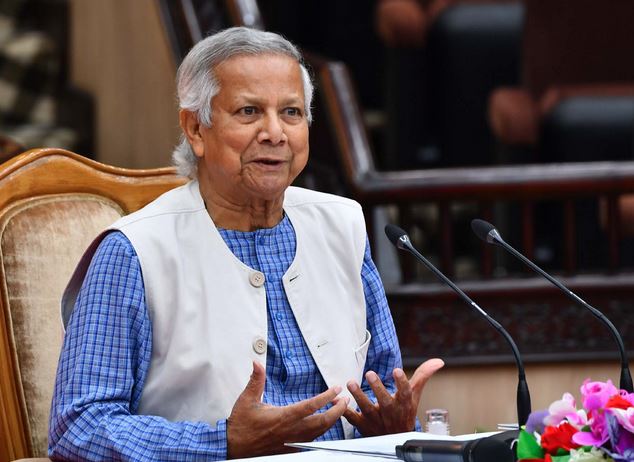Is Bangladesh at a crossroads in clean energy?
Bangladesh’s interim government, led by Chief Adviser Prof. Muhammad Yunus, is taking decisive steps to address the country’s fossil fuel dependence and transition toward renewable energy. With rising energy costs, power shortages, and climate risks, officials say the time for a Bangladesh clean energy transition is now.
“Bangladesh cannot afford prolonged reliance on fossil fuels. It is time to seriously consider clean energy alternatives, including large-scale solar deployment,” Yunus said during a virtual conference with Carl Page, chairman of the Anthropocene Institute.
Bangladesh Renewable Energy Future: Solar Power on the Rise
Bangladesh has gained global recognition for its solar home system (SHS) program, providing electricity to over six million rural homes. Now, the Yunus government is pushing for a Bangladesh renewable energy future that includes industrial-scale solar farms.
“With strong investment and policy support, Bangladesh can become a hub for solar innovation in South Asia.”
Key Drivers of Bangladesh’s Renewable Energy Future
- Government target: 40% electricity from renewable sources by 2041
- Utility-scale solar projects underway in Feni, Gaibandha, and Teknaf
- Rooftop solar solutions growing in industrial zones
Challenges such as land scarcity, grid capacity, and financing gaps remain. Strong policy incentives and foreign partnerships will be crucial to realize the Bangladesh renewable energy future.
Bangladesh Clean Energy Transition
Alongside solar, the government is exploring nuclear power for large-scale, stable electricity supply. The Rooppur Nuclear Power Plant, built with Russian collaboration, is expected to generate 2,400 MW.
“Next-generation nuclear technologies, including barge-mounted reactors, offer reliable, zero-carbon power at lower costs,” said Page.
Prof. Yunus emphasized that nuclear expansion requires rigorous research, safety assessments, and feasibility studies.
“We will explore these opportunities carefully, but there is no question—Bangladesh must drastically reduce its dependence on fossil fuels,” Yunus added.
Economic Implications of the Clean Energy Push
Bangladesh spends billions annually on fossil fuel imports, straining its foreign reserves. Analysts say a strategic pivot toward Bangladesh clean energy could:
- Reduce energy import bills significantly.
- Create jobs in solar installation, nuclear operations, and renewable technology sectors.
- Attract climate financing from the World Bank, ADB, and private investors.
- Ensure industrial competitiveness through a reliable and affordable power supply.
Industry observers believe that integrating solar and nuclear power into the energy mix could also stabilize electricity prices and enhance economic resilience.
Regional and Global Context
Bangladesh is among the most climate-vulnerable nations globally. Rising sea levels, cyclones, and floods make dependence on fossil fuels increasingly unsustainable.
Experts say a successful clean energy transition would position Bangladesh as a regional model in renewable energy, demonstrating how a developing nation can balance economic growth with environmental responsibility.
Economic Impacts: Green Jobs and Industrial Growth
Bangladesh spends billions on fossil fuel imports, straining the economy. A strategic shift to Bangladesh clean energy could:
- Reduce import bills and strengthen reserves
- Create thousands of jobs in solar, nuclear, and renewable sectors
- Attract international climate financing from the World Bank, ADB, and private investors
- Stabilize electricity prices and boost industrial competitiveness
“Clean energy is not just an environmental imperative—it’s an economic opportunity for Bangladesh.”
Policy Outlook: Next Steps for the Yunus Government Energy Policy
The interim government plans to:
- Accelerate solar power projects through public-private partnerships
- Conduct feasibility studies for nuclear power expansion
- Encourage private sector investment in renewable energy
- Expand regional energy trade with India, Nepal, and Bhutan
“We need in-depth studies on promising technologies. But with strong policies, Bangladesh can achieve its renewable energy goals,” Yunus said.
Conclusion
Bangladesh’s energy landscape is at a pivotal juncture. With a clear focus on solar and nuclear power, the Yunus government’s energy policy could drive a historic Bangladesh clean energy transition.
The ultimate question remains: Will Bangladesh seize this opportunity to become a regional clean energy superpower, or will challenges slow its progress?
Ismot Jerin is the founder and Editor-in-Chief of WindNewsToday, an independent publication covering offshore wind, renewable energy policy, and clean power markets with an analytical focus on the United States and global energy transition.
